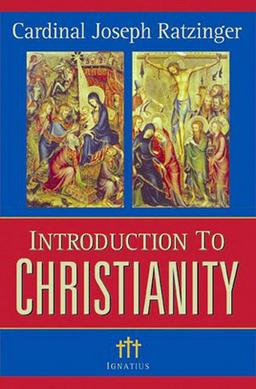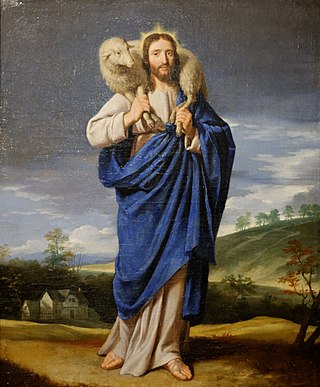The New Testament (NT) is the second division of the Christian biblical canon. It discusses the teachings and person of Jesus, as well as events relating to first-century Christianity. The New Testament's background, the first division of the Christian Bible, is called the Old Testament, which is based primarily upon the Hebrew Bible; together they are regarded as Sacred Scripture by Christians.

Pseudepigrapha are falsely attributed works, texts whose claimed author is not the true author, or a work whose real author attributed it to a figure of the past. The name of the author to whom the work is falsely attributed is often prefixed with the particle "pseudo-", such as for example "pseudo-Aristotle" or "pseudo-Dionysius": these terms refer to the anonymous authors of works falsely attributed to Aristotle and Dionysius the Areopagite, respectively.

The Peshitta is the standard version of the Bible for churches in the Syriac tradition, including the Maronite Church, the Chaldean Catholic Church, the Syriac Catholic Church, the Syriac Orthodox Church, the Malankara Orthodox Syrian Church, the Malabar Independent Syrian Church, the Syro-Malankara Catholic Church, the Assyrian Church of the East and the Syro-Malabar Church.

The Egerton Gospel refers to a collection of three papyrus fragments of a codex of a previously unknown gospel, found in Egypt and sold to the British Museum in 1934; the physical fragments are now dated to the very end of the 2nd century CE. Together they comprise one of the oldest surviving witnesses to any gospel, or any codex. The British Museum lost no time in publishing the text: acquired in the summer of 1934, it was in print in 1935. It is also called the Unknown Gospel, as no ancient source makes reference to it, in addition to being entirely unknown before its publication.

The New Testament apocrypha are a number of writings by early Christians that give accounts of Jesus and his teachings, the nature of God, or the teachings of his apostles and of their lives. Some of these writings were cited as scripture by early Christians, but since the fifth century a widespread consensus has emerged limiting the New Testament to the 27 books of the modern canon. Roman Catholic, Eastern Orthodox, and Protestant churches generally do not view the New Testament apocrypha as part of the Bible.

The Gospel of Judas is a non-canonical Gnostic gospel. The content consists of conversations between Jesus and Judas Iscariot. Given that it includes late 2nd-century theology, it is widely thought to have been composed in the 2nd century by Gnostic Christians. The only copy of it known to exist is a Coptic language text that has been carbon dated to 280 AD, plus or minus 60 years. It has been suggested that the text derives from an earlier manuscript in the Greek language. An English translation was first published in early 2006 by the National Geographic Society.
The Christian Vegetarian Association (CVA) is an international, interdenominational Christian vegetarian organization that promotes responsible stewardship of God's creation through plant-based eating. The CVA advocates vegetarianism from a biblically-based, Christian perspective and sees dietary choice as a valid way to bear witness to Christ's ministry of love, peace, mercy and compassion, and prepare for the Peaceable Kingdom as foretold in the Bible.

The Greek Acts of Philip is an episodic gnostic apocryphal book of acts from the mid-to-late fourth century, originally in fifteen separate acta, that gives an accounting of the miraculous acts performed by the Apostle Philip, with overtones of the heroic romance.

Andrew Linzey is an English Anglican priest, theologian, and prominent figure in Christian vegetarianism. He is a member of the Faculty of Theology at the University of Oxford, and held the world's first academic post in Ethics, Theology and Animal Welfare, the Bede Jarret Senior Research Fellowship at Blackfriars Hall.
Christian vegetarianism is the practice of keeping to a vegetarian lifestyle for reasons connected to or derived from the Christian faith. The three primary reasons are spiritual, nutritional, and ethical. The ethical reasons may include a concern for God's creation, a concern for animal rights and welfare, or both. Likewise, Christian veganism is not using any animal products for reasons connected to or derived from the Christian faith. Pescatarianism was widespread in the early Church, among both the clergy and laity. Among the early Judeo-Christian Gnostics the Ebionites held that John the Baptist, James the Just and Jesus were vegetarians.

Disputes regarding the internal consistency and textual integrity of the Bible have a long history.

Luke 24 is the twenty-fourth and final chapter of the Gospel of Luke in the New Testament of the Christian Bible. The book containing this chapter is anonymous, but early Christian tradition uniformly affirmed that Luke the Evangelist composed this Gospel as well as the Acts of the Apostles. This chapter records the discovery of the resurrection of Jesus Christ, his appearances to his disciples and his ascension into heaven.

Edmond Bordeaux Szekely was a Hungarian philologist/linguist, philosopher, psychologist and natural living enthusiast. Szekely authored The Essene Gospel of Peace, which he claimed he had translated from an ancient text he supposedly discovered in the 1920s. Scholars consider the text a forgery.
A biblical canon is a set of texts which a particular Jewish or Christian religious community regards as part of the Bible.

Introduction to Christianity is a 1968 book written by Joseph Ratzinger. Considered one of his most important and widely read books, it presents a "narrative Christology" that demonstrates the place for faith is in the Church. The book offers a "remarkable elucidation of the Apostle's Creed" and gives an "excellent, modern interpretation of the foundations of Christianity".

Infancy gospels are a genre of religious texts that arose in the 2nd century. They are part of New Testament apocrypha, and provide accounts of the birth and early life of Jesus. The texts are of various and uncertain origin, and are generally non-canonical in major modern branches of Christianity. They include the Gospel of James, which introduces the concept of the Perpetual Virginity of Mary, and the Infancy Gospel of Thomas, both of which cover many miraculous incidents from the life of Mary and the childhood of Jesus that are not included in the canonical gospels. Although the Life of John the Baptist focuses on John the Baptist rather than Jesus or his immediate family, it is also included in the genre as its events would be contemporary with Jesus's early life.

The relationship between Christianity and animal rights is complex, with different Christian communities coming to different conclusions about the status of animals. The topic is closely related to, but broader than, the practices of Christian vegetarians and the various Christian environmentalist movements.
Ralph Ouseley was a major in the British Army who went on to be a major-general in the Portuguese Army and a knight of the Portuguese Empire.









